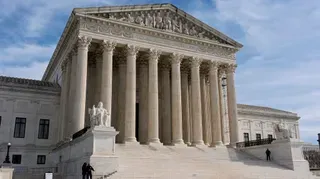February 17, 2008
Bush: Keep abstinence in AIDS program
David Foucher READ TIME: 4 MIN.
DAR ES SALAAM, Tanzania - President Bush on Sunday said Congress should renew his global AIDS program and preserve a requirement that steers money into abstinence efforts.
"We don't want people guessing on the continent of Africa whether the generosity of the American people will continue," Bush said in Tanzania, the second stop of his African trip.
Congress strongly backs the program, which is credited with getting medicine and preventive treatment to millions of people - most of them in sub-Saharan Africa. Yet its renewal has gotten hung up over ideology and political debate about disease prevention.
Some Democrats want to eliminate a provision in the bill that requires one-third of all prevention spending go to abstinence-until-marriage programs. Critics say that while they don't oppose abstinence programs, the inflexible requirement hampers the effort.
Bush said the time for debate is over, and that those seeking changes on both ends of the political spectrum should "stop the squabbling."
The President's Emergency Plan for AIDS Relief, or PEFPAR, expires this year.
"My attitude toward Congress is, see what works," Bush said. "PEPFAR is working. It is a balanced program. It is an ABC program - abstinence, be faithful and condoms. It is a program that's been proven effective."
Tanzania is one of the countries targeted by Bush's emergency AIDS relief effort; more than two-thirds of all people infected with HIV across live in sub-Saharan Africa.
Standing with Bush, Tanzanian President Jakaya Kikwete thanked U.S. lawmakers for the program, but also prodded them to keep it moving. "If this program is discontinued or disrupted, there will be so many people who will lose hope," he said.
Bush is pushing to renew the program at $30 billion over five years, twice his original commitment. Congress has put more than $18 billion into it so far. It is the largest effort to ever target an infectious disease.
Nearing the end of a presidency dominated by the war in Iraq, Bush is targeting disease and poverty in his visits to five African nations. The president and first lady, Laura Bush, began their African trip in Benin in West Africa, then flew to the east coast of the continent to Tanzania. He also plans to visit Rwanda, Ghana and Liberia.
Unlike in the United States, where his approval rating hovers near his record lows, Bush is treated here with reverence. A crowd of people, some wearing clothing bearing Bush's image, waved tiny U.S. and Tanzanian flags to welcome him as he walked down a red carpet toward the State House.
"People may have different views about you and your administration and your legacy," Kikwete said. "But we in Tanzania, if we are to speak for ourselves and for Africa, we know for sure that you, Mr. President, and your administration, have been good friends of our country."
Later, Dar es Salaam's dusty, rutted streets were again lined with the curious as he drove to Amana Hospital. Strolling through the complex of low-slung buildings and sun-drenched courtyards, Bush met with HIV-positive patients and doctors in the facility's AIDS treatment wing, funded in part with PEPFAR dollars.
"I'm very lucky,' said Tatu Msangi, who was tested for HIV while pregnant, received treatment and delivered a healthy baby, Faith, now 2.
Bush said the hospital was the best exhibit he could imagine in his campaign to convince Congress to fund the program the way he wants. He made another appeal for the HIV/AIDS program to be extended beyond his presidency, as Congress is expected to do.
"One of the main reasons I want to make sure the American people know that the program is successful is because I want this program to continue to be funded," Bush said.
The president, who started his remarks at a news conference with a folksy "Howdy" in Swahili, signed a nearly $700 million aid pact with Kikwete to help Tanzania build up its infrastructure.
It's the largest deal under a Bush program that offers economic aid to countries that treat their people fairly, rule justly and root out corruption.
"I'll just put it bluntly, America doesn't want to spend money on people who steal the money from the people," Bush said. "We like dealing with honest people, and compassionate people. We want our money to go to help human condition and to lift human lives as well as fighting corruption in marketplace economies."
At the news conference, both leaders dodged a question about the presidential race in the United States and the candidacy of Sen. Barack Obama, D-Ill., whose father was Kenyan.
Bush, momentarily taken aback by a question about the excitement surrounding Obama's candidacy, said: "Seems like there was a lot of excitement for me."
Kikwete would say only: "Let him be as good a friend of Africa as President Bush has been."
In the afternoon, Bush visited with the families of victims from the 1998 bombing of the U.S. embassy here. He said a silent prayer in front of a plaque in the garden of the new embassy before going inside for private talks. A total of 224 people were killed in the twin bombings in Dar es Salaam and Nairobi.
In their customary gift exchange, Bush received a stuffed lion and leopard, and a zebra skin. In return, Bush gave his Tanzanian host a big black box. Inside was a large pair of autographed basketball sneakers, courtesy of the 7-foot-1 basketball star, Shaquille O'Neal.
David Foucher is the CEO of the EDGE Media Network and Pride Labs LLC, is a member of the National Lesbian & Gay Journalist Association, and is accredited with the Online Society of Film Critics. David lives with his daughter in Dedham MA.







